Content
- General definition
- General intelligence
- IQ
- Social intelligence
- How is it measured
- Emotional intellect
- Signs of high emotional intelligence
- Types of intelligence according to Howard Gardner
- Spatial
- Bodily kinesthetic
- Musical
- Linguistic
- Logical-mathematical
- Interpersonal
- Intrapersonal
- Naturalistic
- Theories on the structure of intelligence
- Research by Charles Spearman
- Raymond Cattell's theory
- Qualities and properties
- Videos about intelligence in psychology
Attempts define the concept of intelligence and has been measured since ancient times. But researchers and psychologists still have not come to a consensus regarding the different theories and the components of this characteristic. There is even an opinion that it is necessary to abandon all variants of the interpretation of this term and replace it with other more specific ones (but they have not yet been introduced either).
General definition
The most common was the interpretation of K. Jaspers, who argued that intelligence is a person who is considered in the aggregate from the side of his unique abilities.
N.N. Moiseev argued that intelligence is goal setting, planning resource options, strategic structure for a given goal. It makes it possible to solve specific long-term tasks, that is, we are talking about the ability to make plans and implement them, as well as calculate the possible risks and consequences of actions that for this are being undertaken.
Most often, psychologists use an interpretation that states that intelligence is characterized by the ability to abstract thinking, logic, analytical operations, the discovery of relationships and laws, learning, adequate perception of data and the ability to solve the set tasks. Tasks can be absolutely any problems encountered in life and requiring a solution.
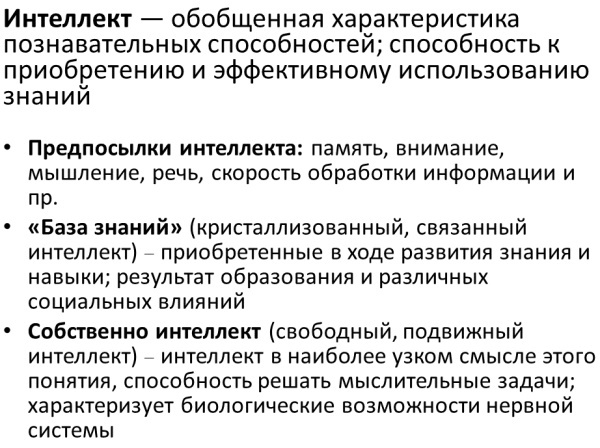
Modern psychologists interpret intelligence as the ability to learn about the world and effectively solve any problems, including mastering fundamentally new skills to remove obstacles. In this regard, intelligence is quite possible to develop, increase or decrease its efficiency.
Intelligence is sometimes characterized in psychology solely in relation to goals that are encountered in life. In particular, this is relevant for survival, which is the main goal, while others only follow from it, as well as to the goals and opportunities realized in a particular area of activity.
General intelligence
In 1904 g. psychologist Ch. Spearman developed the concept of the G factor, also known as general intelligence or the general intelligence factor. The scientist made the discovery by finding the relationship between specific cognitive skills. The concept confirms that a person's ability to act according to a situation is directly dependent on his other skills and level of mental ability.
This factor of general intelligence is usually represented in about half of the questions on testing that determines the level of intelligence. With the help of such tests, it is possible only to assess certain individual abilities, for example, logical thinking or memory, but none of them show the overall picture.
IQ
IQ (intelligence quotient) or intelligence quotient is used to determine intellectual ability. This ratio is expressed by mental age divided by biological age and multiplied by 100. For example, if a 12-year-old has developed a mind that would normally be found in a 14-year-old, then his IQ would be 117.
If, according to the test results, a child has average or even low IQ scores, then this does not mean his future failures. Typically, 90-110 is considered normal, and a low score is less than 70 on most tests.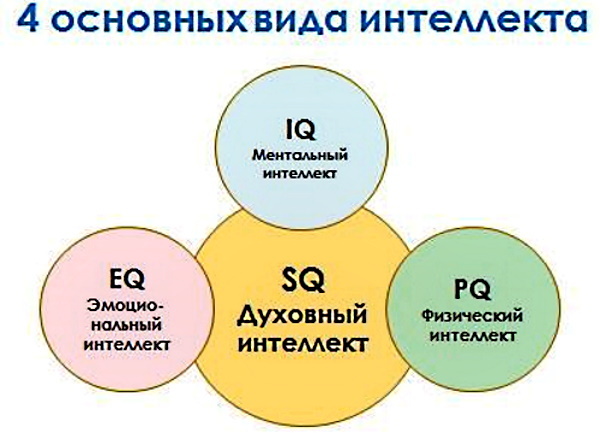
It should be borne in mind that standard testing implies appropriate answers, but a person can think outside the box, creatively, and perform tasks incorrectly. Then an inadequate low result is obtained. It is also possible that a person (most often a child) is lost and can cope with even elementary tasks for them due to excitement and desire to get a high score.
The test results must be carefully studied and given an interpretation, taking into account the individual characteristics of the character and thinking of a person. The most popular test in modern psychological science is the Eysenck test. Also, D. Veksler (a psychiatrist from the United States), since they are considered the most objective. But there is no single standard for determining IQ.
Social intelligence
Intelligence in psychology is the ability to correctly understand what the behavior of a person means. This skill is needed for optimal interpersonal interaction and quick adaptation in a particular society.
This term was first introduced in 1920. used in the psychological works of E. Thorndike for the definition of "foresight in interpersonal relationships." Other researchers have interpreted this term in their own way, concretized it and adapted it.
In particular, in 1937 g. G. Allport saw the relationship between social intelligence and the ability to make almost instant judgments about others, to predict their most likely reactions. In his opinion, this is a special "social gift" that can provide ease of relationship, with this will result in socialized adaptation, but without a deep understanding of the motives and reasons.
How is it measured
For the first time, a reliable diagnostic option for determining the level of social intelligence was developed and introduced into his practice by the researcher J. Guilford. According to his concept, social intelligence is a specific system of intellectual skills, which does not depend on the level and influence of general intelligence.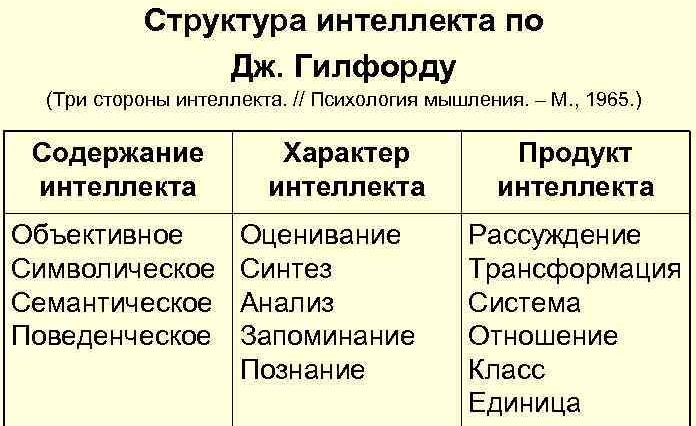
These skills, similarly to the general intellectual, are presented in the form of 3 variable factors: content, operations, results. The researcher was able to single out 1 specific operation - cognition (C), and also focused in the experiments on the concretization and study of behavior (CB).
This skill is determined using 6 factors:
- Behavior Units Definition (CBU) - the ability to highlight a certain verbal and non-verbal expression (this skill is close to the definition of a "figure from the background", which was investigated in Gestalt psychology).
- Determination of levels of behavior (SHS) Is the ability to recognize generalized properties in some data on human behavior that have an expressive or situational color.
- Behavioral Relationship Definition (CBR) Is the ability to understand human relationships that exist.
- Defining Behavioral Systems (CBS) - this is the ability to understand the logic of the formation and further development of integral situational interactions, the semantic load of people's behavior in some specific situations.
- Behavioral Transformation Definition (CBT) Is the ability to understand the initial meaning of similar behavior (verbal and non-verbal) in different situations.
- Behavioral Outcomes (CBI) is the ability to predict the likely outcomes of a behavior based on the data received.
Emotional intellect
It is believed that the most successful and most influential people in the world do not always have a genius for science. The main factor that makes it possible to come to fame, a quick career, recognition is not general intelligence, which is defined as IQ (intelligence quotient), and emotional, denoted by psychologists as EQ (emotional quotient).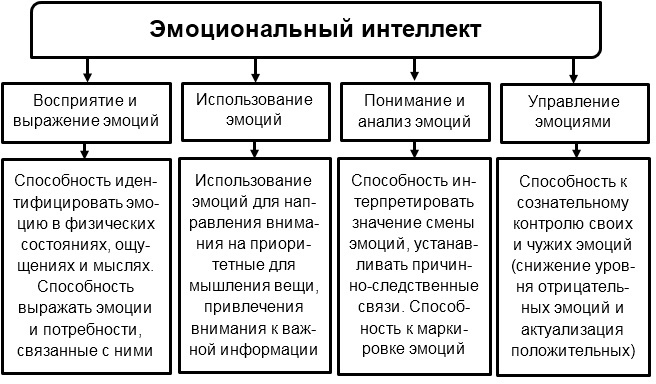
Intelligence is in psychology the human ability to understand and control one's feelings and emotions, interest to the surrounding social world, emotions, as well as the ability to understand the emotional background and control over them.
The concept was formulated by the American researcher L. Gardner in the 90s. XX century. However, it should be noted that its study in recent years has not allowed to form its specific boundaries, in contrast to the IQ indicator.
Signs of high emotional intelligence
Among the studies, a number of features have been identified that indicate a high threshold for emotional intelligence.
In particular, the following can be cited:
- A formed emotional vocabulary is the ability to understand and distinguish adjacent emotions and feelings, as well as describe them;
- An increased interest in the environment, healthy curiosity and empathy is the ability to mentally put oneself in the place of any person, to establish contact;
- Susceptibility to changes, the ability to adapt to everyday circumstances;
- The ability to easily deny yourself and the environment inappropriate desires - such an ability is evidence of self-control and self-respect;
- The ability and desire to share interesting knowledge with others, to give them pleasant unexpected gifts, while not expecting something in return;
- The ability to appreciate what is, not to complain that something is not enough - is extremely useful in life, reduces stress and leads to excellent well-being.
Types of intelligence according to Howard Gardner
The developed concept, which includes the division of intelligence into different types, did not find confirmation for a long time and was considered just a challenge to the IQ test. This testing determines the level of intelligence in quantitative terms. The concept of 8 types of intelligence indicates that all people in one way or another strive for the development of each of these types. This is what contributes to the formation of his ability to cognize not only society, but also the surrounding world as a whole.
This concept was developed by Howard Gardner. It was this researcher in 1983. decided to make changes to the established by that time concepts of intelligence, developed by the school of cognitive sciences. At the moment, despite the reliable and harshness of the research and argumentation, this concept is not generally accepted.
Spatial
This view is characterized by excellent orientation in space of any scale (no matter small or large).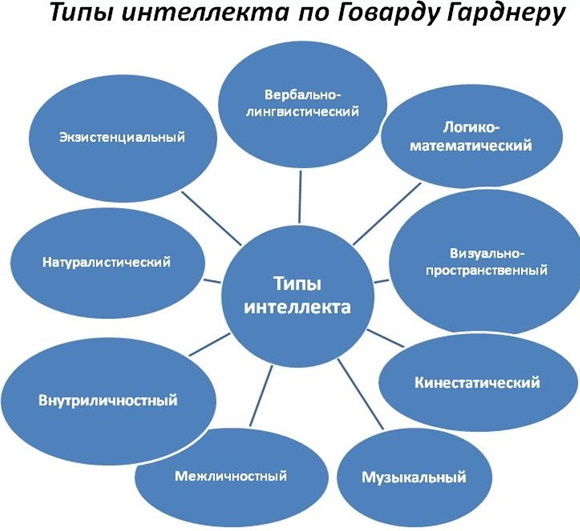 Best of all, this type of intelligence develops in drivers of various vehicles, architects, and chess fans.
Best of all, this type of intelligence develops in drivers of various vehicles, architects, and chess fans.
Bodily kinesthetic
This type of intelligence is characterized by the ability to use one's own body, control it, accuracy of movements, balance, and the like. Developed among dancers, as well as representatives of applied professions.
Musical
This type of intelligence is characterized by an increased sensitivity to sounds and rhythms. Singers, guitarists, pianists and other players on various instruments are usually good at this kind of intelligence.
Linguistic
This type of intelligence determines the good perception of all factors associated with words, their definitions, combinations. This type is dominant among writers, poets, journalists, copywriters.
Logical-mathematical
It is expressed in the ability to understand symbols and facts, to distinguish them from hypotheses and theories. It develops best among scientists.
Interpersonal
It is characterized by the ability to interact with people. Optimal ability to understand, identify emotions, feelings and mood. Developed by successful salespeople, teachers, psychologists.
Intrapersonal
This is the ability to correctly identify and capture your emotions, solutions for peace.
Naturalistic
Intelligence in psychology is an ability that is determined by a sensitive attitude to nature, the ability to understand it, to see the differences between plants, animals, and so on.
The formation of each of the described types of intelligence and their interaction indicate the ability to develop cognition. This concept may explain, for example, why successful musicians did not do well in school.
Theories on the structure of intelligence
At the moment, many concepts and theories have been developed that describe the structure and composition of intelligence, the most famous of which belong to Ch. Spearman and R. Cattell. The latter is also known for its 16-factor test.
Research by Charles Spearman
Ch. Spearman at the beginning of the 20th century formulated 2 central factors: G (general - general) and S (special - specific). 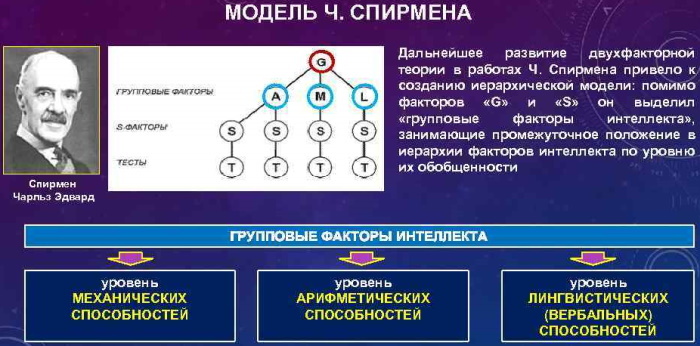 G determines the general level, S - specific skills, the specifics of thinking, perception and other abilities used to solve any specific life tasks.
G determines the general level, S - specific skills, the specifics of thinking, perception and other abilities used to solve any specific life tasks.
Raymond Cattell's theory
In the 40s. the last century, the concept of general intelligence was refined by the researcher Cattel, who formulated and proved the existence of the concepts of "mobile" and "crystalline" intelligence, which have become structural parts of the general intelligence.
A mobile look characterizes a person's ability to substantiate his own actions and decisions, the ability to find a way out of different life situations, regardless of experience.
In other words, a person uses this type of intelligence for analytical activities, identifying classical patterns of behavior and cause-and-effect relationships when using elementary logical techniques and conclusions. The researcher believed that this type of intelligence is directly related to genetic heritage, but does not depend in any way on education and learning ability.
At the same time, crystalline intelligence cannot be innate and has no connections with the formation and operation of the human nervous system. In other words, it develops exclusively in the training and development of personal culture. This type of intelligence consists of generalized knowledge about normal human activities, the lexical layer, phrases, the use of equipment and tools, the formation of reports, and so on.
In other words, in the event that a new task appears and a person realizes that he has already met something similar before, it is the crystallized intellect that is involved. In the absence of previous experience, the mobile type is used.
Qualities and properties
Significant properties of intelligence include inquisitiveness and depth of mind, as well as flexibility and mobility, the ability for logic and evidence: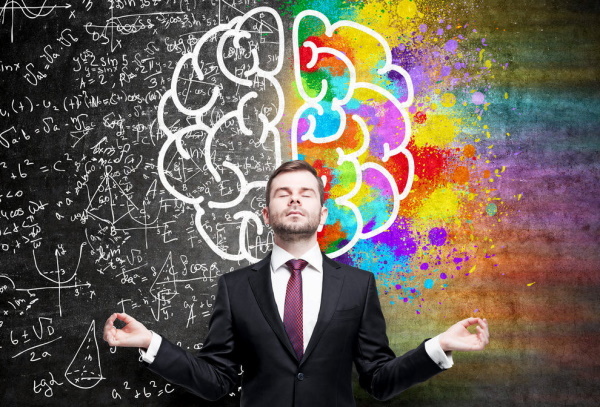
| Properties of the mind | Characteristic and value |
| curiosity | the desire to comprehensively learn about any phenomenon or object in a real relationship is determined by active cognition |
| depth of mind | determined by the ability to separate the main points from the secondary ones, the necessary from the optional |
| flexibility and mobility | this is the ability to make extensive use of one's own experience, quickly and clearly quickly study the elements of new relationships and relationships, abstract from the patterns of thinking |
| consistency | is determined by a clear sequence of fabrications, the ability to take into account any significant elements in the inspected object, all kinds of relationships |
| evidence | is determined by the ability to use at the necessary time the facts, patterns, convincing of the fidelity of fabrications and conclusions |
| criticality | characterized by the ability to clearly assess the results of fabrications, the ability to critically evaluate them, avoid the wrong decision, stop your own actions if they do not contribute to the decision assigned tasks |
| latitude | this is the ability to see the whole task as a whole, while not losing sight of the initial information accompanying the task at hand, to cover different options in solving the issue |
Knowledge arises during learning and practical application. A significant supply of useful information (erudition) is a very important element of intelligence. It is impossible to fully and comprehensively assess the mental development of a person who has mastered a huge amount of knowledge, since the stock of knowledge cannot reflect the entire intellect.
A person may have 3 higher education degrees, but at the same time he may not have a high level of intelligence. And a person with a relatively small stock of knowledge cannot be considered backward. The ability to reason, apply one's life experience and knowledge can be at a significant level, and this, under certain conditions, will manifest itself in achieving success.
The factor of intellectual development is influenced by factors:
- genetic heritage;
- the living and cultural level of the family;
- methods of teaching and upbringing in preschool age;
- maternal health during pregnancy.
However, these factors do not indicate that intellectual development begins only at an early age. At this time, the foundations can be laid, but intelligence includes many different structural elements. It also changes throughout a person's life.
Intelligence is a generalized mental ability that includes the ability to draw conclusions, predict, solve problems and questions. It also allows you to plan, abstract, delve into complex concepts.
We must not forget about the opportunity to learn on the basis of our own and other people's experience. It is not only about studying material and data, specific academic knowledge or the ability to pass tests competently. This concept in psychology includes broad and deep skills to recognize the world around us, to determine the essence of phenomena and to determine how to act in a given situation.
Videos about intelligence in psychology
Cognitive Psychology. What is intelligence:
